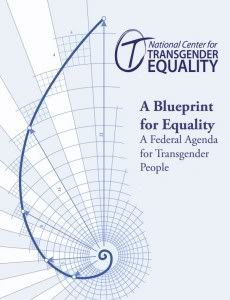 The ACLU and the National Center for Transgender Equality have joined together to write a letter to the Social Security Administration expressing concern over the lack of action by the SSA on policy matters important to transpeople.
The ACLU and the National Center for Transgender Equality have joined together to write a letter to the Social Security Administration expressing concern over the lack of action by the SSA on policy matters important to transpeople.
Areas of concern addressed in the letter include the need for an updated policy for changing information (eg. name, gender) on SSA records, revision of guidance regarding marriages involving a transgender spouse to accurately reflect state and federal laws, and the phasing out of the use of gender data in SSA computer matching programs.
The ACLU views the ability of transgender people to have identifying documents and records that accurately and consistently reflect their lived gender as essential. As the coalition letter states, having identification and records that misrepresent one’s lived gender “outs” a transgender person in any situation where he or she needs to rely on these records, whether for purposes of employment or conducting business with state and local government offices. This not only violates the privacy rights of transgender people, it also puts them at serious risk for discrimination, especially in the 34 states that currently lack explicit nondiscrimination protections for individuals based on gender identity.
As the ACLU says on its Discrimination Against Transgender People page,
The ACLU champions the rights of transgender people to live their lives freely and with respect. We fight for protections against discrimination in employment, housing, public accommodations (including schools), and health care. We also challenge obstacles to people obtaining government identity documents respectful of their gender identity, as well as barriers to transgender parents seeking continuing relationships with their children.
Earlier this year the ACLU argued in Alaska Superior Court that the State refusing to change the gender marker on a driver’s license or for the State to require surgery prior to such a change places an undue burden on an individual’s right to privacy and equality. On March 12 the Court ruled in K.L. v State of Alaska that refusal to change gender markers on state driver’s licenses was unconstitutional.
In September of 2011 the SSA said it would end the practice of alerting employers when the gender marker on an employee’s W-2 did not match SSA records. The “gender no-match” letters were an efficient way of outing transpeople to their employers and prospective employers. 711,488 gender no-match letters were sent in 2010 alone. But the SSA continues to use gender in other matching programs, “needlessly violating the privacy rights of transgender workers and putting them at risk for discrimination.”
It is time for SSA to act. These requests to SSA are critically important policy matters for transgender people that go to the heart of what it means to have your gender identity recognized and respected by the government.
–ACLU
And if the government does not recognize and respect our genders, what chance is there that its citizens will?
 The SSA is also at the forefront of another equality battle. Leveling the financial advantages of being American citizens, especially a senior citizens, should certainly be a concern of the SSA.
The SSA is also at the forefront of another equality battle. Leveling the financial advantages of being American citizens, especially a senior citizens, should certainly be a concern of the SSA.
One of the key pocketbook issues is that it is impossible for LGBT couples to access the valuable spousal, survivor and death benefits from Social Security, although they pay the same FICA taxes as heterosexual workers, and are nearly twice as likely to live in poverty than heterosexual seniors. Average Social Security benefits are 32 percent lower for LGBT couples than for heterosexual couples, according to The Williams Institute, a think tank focused on sexual orientation and gender identity law and public policy at the UCLA School of Law.
Under Social Security’s rules, spouses can receive the greater of their own benefit or half of a spouse’s benefit. And a surviving spouse can receive the greater of his or her own benefit, or 100 percent of the spouse’s benefit.
Of course DOMA defines the definition of “spouse” to exclude same-sex unions.
A move is afoot to change the Social Security Act itself. A coalition of advocacy groups has proposed the Social Security Equality Act [HR 4609], which would let couples in relationships recognized by their state of residence to receive the same Social Security benefits as heterosexual married couples. The bill, sponsored by Rep. Linda Sánchez, a Democrat from California, would recognize domestic partnership, civil union and marriage.
Last week, the National Committee to Protect Social Security and Medicare proposed removing gender-specific definitions of the words “husband” and “wife” in the Act as part of a broader proposal to enhance and reform Social Security benefits.
Social Security is based on a simple formula — work hard, pay into it with each paycheck, and be able to retire with dignity. This must apply to all Americans, regardless of their sexual orientation. It is time the Social Security Administration ends a misguided policy that discriminates against same-sex couples.
–Linda Sánchez
There are also health concerns, involving Medicare and Medicaid.

Same-sex couples also face financial trouble with their healthcare when they are seniors. Eligibility for Medicare is based on the number of quarters in which you have paid payroll taxes into the system. At age 65, anyone with a work history of at least 40 quarters can enroll for Medicare Part A (hospitalization) without paying a premium. Everyone pays a premium for Part B (doctors’ visits), Part D (prescription drugs) or a supplemental medical policy. But access to the entire program is predicated on Part A enrollment.
You can also enroll without paying a premium if a spouse qualifies.
Oops. Our bad.
That last part wouldn’t be available to us LGBT people, would it? We will instead be required, if we have less than 30 quarters , to pay a monthly Part A premium of $451.
But there is some help available.
Medicaid has rules aimed at preventing healthy spouses from having to impoverish themselves in order for the ill spouse to qualify for Medicaid; the U.S. Department of Health and Human Services has issued guidelines to states on how the spousal protections can be extended to LGBT couples.
 In recently broken news just yesterday US District Court Judge Claudia Wilken ruled that DOMA and the US Tax Code unconstitutionally prevent same-sex couples and domestic partners from participating in CalPERS (the California Public Employees Retirement System). Wilken found that the federal government’s legal definition of “marriage” and “spouse” in Section 3 of DOMA…
In recently broken news just yesterday US District Court Judge Claudia Wilken ruled that DOMA and the US Tax Code unconstitutionally prevent same-sex couples and domestic partners from participating in CalPERS (the California Public Employees Retirement System). Wilken found that the federal government’s legal definition of “marriage” and “spouse” in Section 3 of DOMA…
violates the equal protection rights of Plaintiff same-sex spouses” and that subparagraph (C) of Section 7702B(f) of the Internal Revenue Code “violates the equal protection rights of Plaintiff registered domestic partners.
Wilken ordered CalPERS not to use DOMA or the relevant tax provision to deny enrollment to same-sex spouse and registered domestic partners in the state. She also ordered that the federal government not disqualify CalPERS’s plan from the beneficial tax treatment for following the court order. Finally, Wilken established in Thursday’s ruling that the decision would be stayed, or put on hold, during an appeal of her decision if one is sought.

1 comments
Author
…is here. The Act was referred to the House Committee on Ways and Means on April 24.
An important part of the Act: